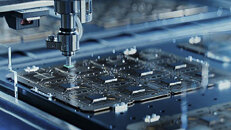- Joined
- Aug 19, 2017
- Messages
- 2,929 (1.05/day)
Intel's Foundry business is the company's current pain point and probably the reason why the company board of directors forced out ex-CEO Pat Gelsinger. However, the new interim co-CEO, David Zinsner, confirmed that the foundry plan would remain the same. At the UBS technology conference, Zinsner indicated that the company's core strategy remains unchanged and reiterated the forecasts shared in October, highlighting optimism about growth in its PC and server segments. This is a healthy sign that Intel will not lose its foundry subsidiary, which, even though difficult to operate, could be Intel's silver lining with growth opportunities ahead.
Yesterday, we covered the choice of Lip-Bu Tan as Intel's next CEO. However, the new co-CEO, Zinsner, stated, "I'm not in the process, but I'm guessing that the CEO will have some capability around foundry as well as on the product side." A new CEO would be left with a lot of work that, apparently, no one so far can finish. There are speculations that Intel's 18A node is yielding 10% of usable silicon, while Intel's head of foundry business, Naga Chandrasekaran, has noted that 18A node is going through evolution phases to improve final yields and remain profitable, noting that "there's nothing fundamentally challenging on this node now. It is about going through the remaining yield challenges, defect density challenges."

View at TechPowerUp Main Site | Source
Yesterday, we covered the choice of Lip-Bu Tan as Intel's next CEO. However, the new co-CEO, Zinsner, stated, "I'm not in the process, but I'm guessing that the CEO will have some capability around foundry as well as on the product side." A new CEO would be left with a lot of work that, apparently, no one so far can finish. There are speculations that Intel's 18A node is yielding 10% of usable silicon, while Intel's head of foundry business, Naga Chandrasekaran, has noted that 18A node is going through evolution phases to improve final yields and remain profitable, noting that "there's nothing fundamentally challenging on this node now. It is about going through the remaining yield challenges, defect density challenges."

View at TechPowerUp Main Site | Source




